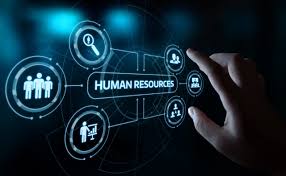Human Resources (HR): Meaning and Responsibilities
Human Resources (HR): Meaning and Responsibilities
What IS Human Resources (HR)?
Human resources (HR) is the part of a business responsible for finding, recruiting, screening, and training job applicants and administering employee benefits programs. the primary goal of HR is to support employee recruitment, engagement, and overall productivity, which can vary between organizations and positions.
HR is key to helping companies navigate a fast-changing business environment and meet the growing demand for quality employees in the 21st century. It also fosters a positive workplace culture and ensures compliance with labor laws, which can contribute to a company's success in a competitive market.
Key Takeaways:
- Human resources (HR) is the division of a business responsible for recruiting, screening, and training job applicants.
- HR departments manage employee compensation, benefits, and terminations.
- Human resource management (HRM) strategies focus on actively advancing and improving an organization's workforce to improve the organization itself.
- HR departments must stay current with laws affecting the company and its employees.
- Many companies outsource traditional HR administrative tasks, such as payroll and benefits, to outside vendors.
Understanding Human Resources (HR)
John R. Commons, an American institutional economist, first coined the term “human resource” in his 1893 book "The Distribution of Wealth." However, it wasn't until the 20th century that HR departments began to take shape, formally addressing misunderstandings between employees and employers.
Today, an HR department is a vital part of any business, regardless of its size. Its primary goal is to maximize employee productivity while protecting the company from workforce-related issues.
HR responsibilities include:
- Managing compensation and benefits
- Recruiting and retaining employees
- Handling terminations
- Maintaining compliance with any laws that may affect the company and its employees
These responsibilities are crucial for maintaining a productive and compliant workplace, making HR departments an invaluable part of any company.
Key HR Activities
The following are the key, people-related activities that HR must effectively do to add value to a company:
- Managing and utilizing people effectively
- Linking performance appraisals and compensation to competencies
- Calculating fair compensation rates and putting together a comprehensive list of benefits
- Developing competencies that enhance individual and organizational performance
- Increasing innovation, creativity, and flexibility to boost competitiveness
- Applying new approaches to work process design, succession planning, career development, and inter-organizational mobility
- Managing the implementation and integration of technology through improved staffing, training, and communication with employees
- Navigating complex and evolving labor laws to avoid legal issues, and regularly conducting compliance audits to maintain best practices and adherence to regulations
HR Management Strategies
Starting in the 1980s, there was a movement toward strategic initiatives within HR departments, driven by research on the impact of employee-related issues on long-term business success.
These strategies are collectively called human resource management (HRM). They provide a comprehensive approach to managing employees and an organization’s culture and environment. HRM focuses on recruiting, managing, and guiding the workforce to align with the organization's goals.
HR departments adopting HRM strategies are more active in enhancing the workforce and recommending processes, approaches, and business solutions to management.
Google is one example of an organization that has adopted a more active approach to employee relations through its HR department. The company offers numerous perks, such as employee assistance programs focused on mental health, on-site meals and snacks, fitness centers, massage programs, and ergonomic support, believing happy employees are more productive.
HR Outsourcing
Since the mid-20th century, some companies have outsourced some of the more traditional administrative, transactional HR functions to free the department to recommend and implement more meaningful, value-adding programs that positively impact the business.
Functions that may be outsourced in this process include:
- Payroll administration
- Employee benefits
- Recruitment
- Background checks
- Exit interviews
- Risk management
- Dispute resolution
- Safety inspection
- Office Policies
The use of modern tools, such as recruitment software, can help improve the efficiency of HR departments. This can, in turn, give these departments more leeway to focus on adding ever-greater value.
What Is the Role of Human Resources?
A human resources department focuses on recruiting and retaining employees within a company. HR is responsible for finding, hiring, and training employees, overseeing employee relations, and managing benefit programs. It's the go-to place for employees to ask questions about their roles, address concerns, and air grievances.
What Is Human Resource Management (HRM)?
Human resource management (HRM) is a strategic approach to managing company employees, the work culture, and the work environment so that people can function as effectively and productively as possible. Typically, it involves using metrics to measure workforce success.
What Are the Five Functions of Human Resources?
There are numerous important human resources functions carried out by an HR department. Five well-known types of responsibilities are:
- Recruiting, hiring, and onboarding new employees
- Handling employee compensation and benefits
- Offering employee job/career development
- Addressing work-related issues of individual employees
- Developing policies that affect a working environment company-wide
The Bottom Line
A company’s human resources (HR) department manages the entire employee lifecycle—from recruitment and onboarding to training and termination or retirement. HR departments must also stay updated on industry trends and compliance issues to ensure legal adherence.
Increasingly, HR departments focus on human resource management (HRM), using strategic investments and initiatives to improve an organization's workforce. The long-term goal of HRM is to create a more positive, loyal, and productive workforce, ultimately benefiting the company.





